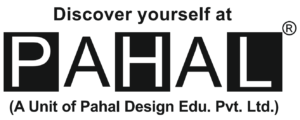JKLU
About JKLU
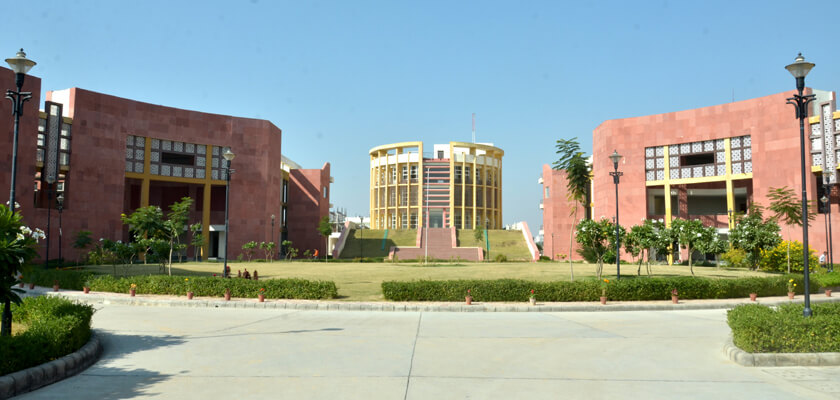
Established in 2011, JK Lakshmipat University (JKLU) is located in the historic city of Jaipur, Rajasthan. Supported by the JK Organization- 125 years old legacy of contributions to nation-building JKLU is passionate about building the country’s most innovative higher education institution. The 30-acre campus is a modern, environmentally conscious, and inviting space designed to help students live, work and play in a setting that is safe, productive, and student-centric.JKLU’s application-based learning model focuses on providing opportunities to learn by doing- through our state-of-the-art labs, Practice Schools, Centre for Entrepreneurship & Innovation, immersive internships, and constant industry interface. JKLU believes that exposure to multidisciplinary perspectives such as learning from the Liberal Arts is as important as building expertise in core technical and management domains. Through their Centre for Communication & Critical Thinking and a dedicated Career Services team, they are committed to the development of their students.
About Institute of Design, JKLU
Established in 2019, the Institute of Design, JKLU has developed a contemporary pedagogy that is both relevant and new to enable students to adapt to rapidly changing learning environments. The design curriculum at JKLU sits at the crossroads of technology, business, society, culture, and people. Students are fostered to understand technologies like AI, IoT, and automation that are transforming the nature of Design. They are enabled to develop a deep sense of empathy with design’s role in building society.
The Institute of Design, JKLU offers the following programs:
Bachelor of Design (B.DES.)
- Product D esign
- Interaction Design
- Interdisciplinary Design
- Integrated Communication Design
Master of Design (M.DES.)
- Product Design
- Interaction Design
Why B.Des. at JKLU
- Evolved classroom learning with inclusion of online resources contributing to the students’ learning.
- Anywhere, anytime, any size learning at a pace you want with the always-on internet.
- Collaborative approach to knowledge construction through constant collaborations.
- Peer-assessed, Industry- evaluated projects to help students to learn from each other.
- Studio based courses with workshop practice to make it both hands-on and minds-on.
- Skill development through constant thinking and analytical capabilities expansion.
- Award-winning faculty from NID, IIT and other premier institutions in India and abroad.
B.Des. in Product Design
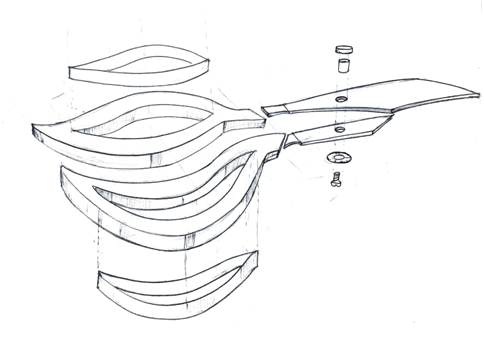
The 4-year program in Product Design aims to create a new brand of individualistic product designers who enjoy creating with their hands and yet comfortably leverage new-age technology. B.Des. in Product Design is both people-centric and technology-led.
This 4-year program introduces you to new technologies that help you transform into a process-driven thinker whose work promotes sustainability and positively impacts the economy and society.
Learners get to select projects from varied areas like agriculture products, medical products, children’s products, and products for the elderly, where they work on improving their way of life, besides working on digital products that prepare them for the future. This course offers contemporary practices that put learners at ease with both artisanal and IoT products. Here, learners follow a curriculum that is current and contemporary.
Good grounding in knowledge of typography, layouts, color, and form, helps in developing interactions that are visually delightful.
B.Des. in Interaction Design
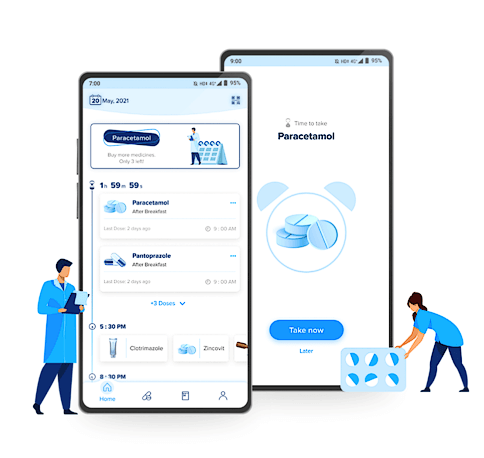
The 4-Year Programme in Interaction Design is unique and relevant to the millennial generation. This Programme caters to the new, hard-wired, device-friendly, young audiences that are as comfortable in the virtual world, as they are in the real world. The program is as much about digital devices as about analog conversations. It is about cognitive sciences as well as computer sciences.
Students get first-hand experience in designing and developing complex systems that deliver delightful digital experiences. They get hands-on inputs to develop the user-centric design. Courses in cognitive ergonomics, human-computer interface, and UI / UX help in creating good user experiences. A basic understanding of coding helps them in developing digital products. They also work on real-life projects like designing apps and portals for new businesses.
Students are introduced to new methods of quick prototyping to validate their design solutions. Good grounding on typography, layouts, color, and form, helps in developing interactions that are a visual delight. A grounding in entrepreneurship prepares them to work out design proposals and business plans.
The graduates find opportunities as interaction designers in technology companies and big corporations. They are also sought after by start-ups in digital products and app development. Organizations that develop software need UX or user experience designers who would interpret the man-machine interface. Service design is another area of work for interaction designers, who understand the systemic approach to problem-solving.
B.Des. in Interdisciplinary Design
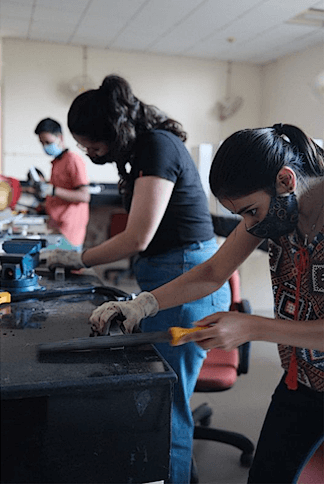
The 4-Year Programme in Interdisciplinary Design is a Unique opportunity for students who want to understand the breadth of design. It allows the students to explore facets of different disciplines including visual design, product design, interaction design, spatial and interior design, with a focus on problem solving and application.
Students will be able to take courses not only from various domains and disciplines of design but also from other institutes of the university. They will learn to leverage new-age technology and hone an entrepreneurial mindset. The students will become adept at understanding form and aesthetics, visual language, and user-centric approaches to developing products and systems in any discipline. Graduates of inter-disciplinary will develop a curious mindset and be able to work in unfamiliar environments as they are trained to deal with ambiguity.
Graduates of inter-disciplinary design will find opportunities in large organizations that wish to leverage design in their business as well as those start-ups where design plays an important role. With inputs in engineering and entrepreneurship, the inter-disciplinary design student will have a distinct advantage to act as the bridge between different functions in any environment and will also have the option to specialize later in an area of their choosing.
They will find work in design firms that do cross-disciplinary work, creative agencies, startups that need design inputs. They will also be singularly eligible to start their own agency. Many will go further into a specialization that they enjoyed in their undergraduate program. Some will take the research route and may also excel in academics.
B.Des. in Integrated Communication Design
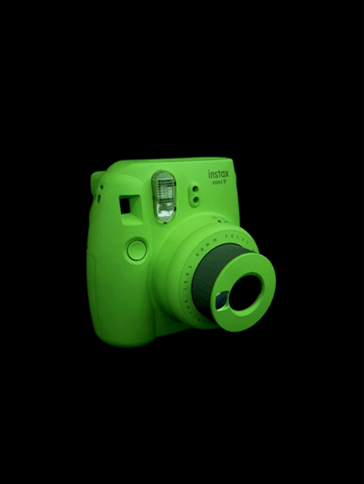
The 4-years program in integrated communication design has a re-imagined curriculum that focuses on the traditional and new age – from motion to typography, writing to graphics, imaging data to analytics to understand impact.
Developed by industry stalwarts, the program is poised to produce graduates who are ready and relevant for tomorrow’s needs. The nature of communication design has changed significantly in the information economy. Content production has become primarily digital. The internet has given the power of creating content to one and all and consuming content has become cursory and transient. From analog print magazines to digitally enhanced videos, communication designers need to negotiate different domains. They need to become strategic thinkers, techno-mavericks, and uber-creative professionals.
The program is predominantly hands-on and follows the ‘learning by doing’ routine. Project-based learning prepares students for a career that will be both inspiring and invigorating. Students are exposed to all media and related software. Students work on design assignments that define the nature of their career options.
Students learn to work on communication projects that are human-centric. They apply the principles of design thinking in solving the communication problems for the creative industries like advertising, print, web, film and video, new media, and tech start-ups as well as designing for social concerns like the health and education of the masses.
The discipline at JKLU includes a number of design practices, including graphic design, web design, information design, information architecture, advertising and branding, wayfinding, social communication, and motion graphics. Project-based learning is the mantra at the institute of design.
Eligibility:
- Minimum 60% aggregate marks in both Class X & XII or equivalent grades.
- Candidates should have passed classes 10th and 12th from a recognized Central/ State Board/ University
in India or in any foreign country recognized as equivalent to the 10+2 system by the Association of Indian Universities (AIU). - Students appearing in the final examination of 10+2 may also apply. However, the admission will be provisional subject to achieving the minimum marks.
- The applicants are required to appear in one of the Design Entrance Tests from NID-DAT or UCEED. In case the student has not appeared for either, he/she must appear for JKLU-DET.
- Foreign Nationals/ Persons of Indian Origin/ Non-Resident Indian candidates can be considered for admission on the basis of their marks in 10+2 or equivalent examination only.
Scholarships:
To encourage and support meritorious applicants, JKLU has a very distinctive scholarship program. Applicants may qualify for a scholarship up to full waiver of the University Academic and Hostel Fee.
The scholarship is awarded based on:
NID-DAT, CEED or JKLU DET Exam.
The scholarship offered by JKLU is applicable for the duration of the programme, subject to maintaining the required CGPA.
Admission Process:
The selection of a student at JKLU will be finalized after a series of evaluative steps.
- Step 01: Submission of the application form with required details. Non-refundable application fee of Rs. 750/- to be paid by 31st March 2023. After 31st March 2023, Rs. 1000/- is to be paid.
- Step 02: JKLU-DET or submission of scores from national entrance exams of NID-DAT or UCEED.
- Step 03: Portfolio and interview round with the faculty of design at JKLU.
Fee Structure:
| Academic Year | 2023-2024 |
| Academic Fee (in Rupees) | 1,99,000 |
| Technology Fee | 25,000 |
| Total | 2,24,000 |
Note: The Fee will increase maximum by 10% in each consecutive year.
M.Des
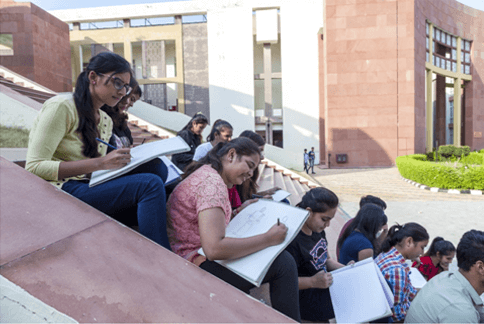
Design is an exciting new domain that is in-demand, rewarding, and creative. In the short time since it was established, the Institute of Design at JKLU has made an impact following which a flagship and innovative M.Des. program has been launched. The program is designed to be modular. The 2-year program is split into smaller modules so that the students can not only get a qualification but also enhance the career opportunities with each module. The two-year program allows the students to do it in parts with intermediate certifications. Students earn credits and build their qualifications into a PG degree.
Semester 01: Certificate in Design Thinking for Innovation
Project-based learning of skills and techniques associated with design thinking is taught. Learners shall be equipped with tools and methodologies, which help in developing a problem-solving mindset as an augmentation to their professional personas. Opportunity scope post-completion includes innovation-centric roles in their core disciplines and many more. This curation of inputs shall help them build an understanding of the elements & principles of design.
Semester 02: PG Diploma in Integral Design
Learners graduate from the foundation to the second semester which orients them to undertake projects with conceiving various products and services. Courses like design, form and material exploration, computer-aided design, and more deepen the learner’s understanding of design and help the learners come up with objects and solutions that cater to human/ social need in a user-centric and integrated manner.
Engagement as product designers and managers in the domains like UI UX, product design, furniture industry, crafts and livelihoods, tech-based startups, and documentation. Opportunity scope post-completion includes product management, design apprenticeships, interdisciplinary roles in consultancies, design roles in startups in UI UX, product design and manufacturing, brand and identity design, and many more.
Semester 03/04: M.Des. in Interaction Design / M.Des. in Product Design
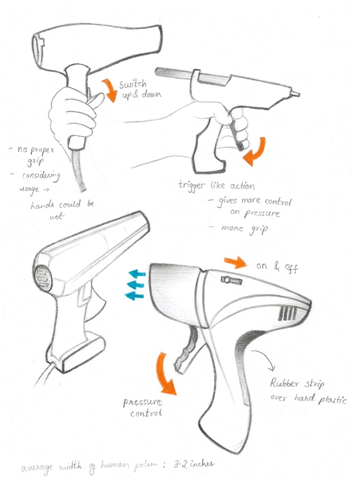
The final 12 months of the program can be split into two semesters, and the final semester can be allocated to a graduation/capstone project that brings together the learnings of the entire program. The program builds over the previous block by foraying into advanced study of triggers like materials, techniques, product detailing etc.
Graduating from a technically simple product, this semester deals with the design of technically complex products, experiences, and systems thinking in design. Throughout the year, learners are exposed to a variety of challenges and scenarios where design plays an important role.
Domains like IoT, healthcare, social and environmental impact, etc. Can be triggers for learners to develop a deeper and holistic understanding. Engagement as expert designers and project coordinators in domains like UI UX, product design, furniture and lifestyle, tech-based startups, crafts and livelihoods, social sector organizations, branding and identity consultancies, appliance and home betterment industry & service design.
Why M.Des. at JKLU:
- Hands-on studios and maker-space workshops.
- Industry integrated projects.
- Courses taught by accomplished faculty and professionals from Design and Technology.
- Project based learning approach.
- Visiting faculty from industry to provide a practitioner’s ‘from-the-trenches’ insights and perspectives.
- 100% placement assistance.
Eligibility:
- Minimum 60% marks or equivalent CGPA in a three-year bachelor’s degree (10+2+3) or equivalent in any discipline from a recognized university.
- Students appearing in the final examination for a bachelor’s degree can also apply.
- The candidates must have appeared in CEED or any other national-level entrance test. In case the candidate has not appeared for any of the mentioned tests, they will have to appear in the JKLU Design Entrance Test (DET) to qualify for the programs.
M.Des Scholarship:
To encourage and support meritorious applicants, JKLU has a very distinctive scholarship program. The applicant may qualify for a scholarship up to ₹150,000/-
Admission Process:
The selection of a student at JKLU will be finalized after a series of evaluative steps.
- Step 01: Submission of the application form with required details. Non-refundable application fee of Rs. 750/- to be paid till 31st March 2023. After 31st March 2023, Rs. 1000/- to be paid.
- Step 02: JKLU-DET or submission of scores from national entrance exams of NID-DAT or CEED.
- Step 03: Portfolio and interview round with the faculty of design at JKLU.
JK Lakshmipat University
Address: JK Lakshmipat University, Near Mahindra SEZ, P.O. Mahapura Ajmer Road, Jaipur – 302 026, Rajasthan, India.
Contact: +91-83022 23344
Email: admissions@jklu.edu.in
Website: https://www.jklu.edu.in/

